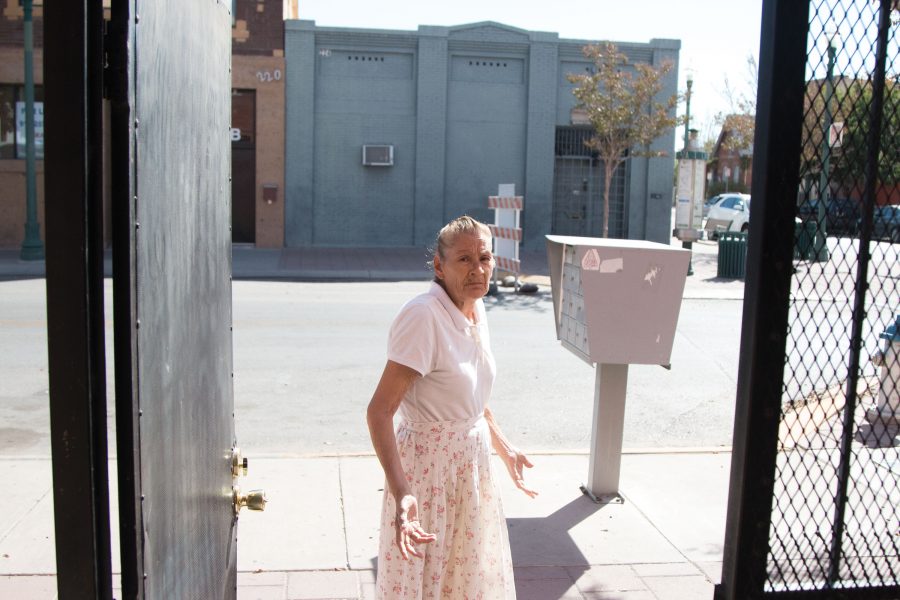Editor’s note: This is the first part of a three-part series on the Save the Union Plaza efforts. The quotes from Salvador Ortiz have been translated from Spanish.
Just south of the Chihuahuas’ Southwest University Park and the Union Plaza bar scene of downtown El Paso sits four blocks of quiet houses, small businesses and apartment complexes.
The neighborhood—once referred to as “Durangito” because of immigrants residing there from Durango, Mexico in the early 1900s—might be demolished to make room for the foundation of a new arena.
In 2012, the citizens of El Paso voted to pass a quality of life bond. The bond included the creation of a Hispanic Cultural Center, a city swimming pool, libraries and—the most expensive effort—a $180-million multipurpose arena.
On Thursday, Oct. 13, the city announced they were going forward with the arena and moving to acquire the area south of Civic Center Plaza; which includes the Convention Center and the Abraham Chavez Theater. The following Tuesday, Oct. 18, city council voted to approve the arena’s proposed location. El Paso Mayor Oscar Leeser stated that he does not support the use of eminent domain when city council proposed the arena’s location.
The approved area is bordered by West Paisano Street on the south side, Leon Street on the west side, West San Antonio Avenue on the north side and South Santa Fe Street on the east side.
City attorney Sylvia Borunda Firth assured there were no historically designated buildings in the area. But Miguel Juárez, doctoral candidate in borderlands history, said there are buildings eligible to qualify as historic, but were only identified as important by the city. They were never actually registered with the state or federal government.
Since there are no contributing buildings registered, city council could move forward with the location for the arena.
“To register a property you have to write its history out. It’s a long form and then you have to identify specific buildings that are called contributing properties and then non-contributing,” Juárez said.
Juárez is a current member of state Sen. Jose Rodriguez’s advisory committee on cultural heritage that promotes heritage tourism, which the area of Durangito is considered.
On Oct. 17, Juárez started a Facebook page entitled Save the Union Plaza Neighborhood.
“What’s great is that a lot of young people are joining,” he said. “This is an issue where not everyone knows about eminent domain because you haven’t experienced it in your lifetime.”
Eminent domain is defined as the acquisition of property by municipality or by state government or federal government to acquire property.
For the creation of the Spaghetti Bowl, which connects Interstate 10 and U.S. Route 54, along with the rest of El Paso’s highway system, the city enacted eminent domain to obtain property for construction. Juárez has played a key role in efforts to successfully save the historic Lincoln Center, which was proposed for demolition under the Interstate 10’s Spaghetti Bowl in 2008.
“What they do is they appraise the property value and then they offer a one-time offer to the owner,” Juárez said. “The owner basically does not have a choice. If they don’t accept it and say ‘no I want more money’ the entity comes around and says ‘well that’s all we can offer because your property value is X and if you don’t accept it then we’ll condemn your property.’”
Long-time resident of the Union Plaza neighborhood, Salvador Ortiz, 85, lives in the apartments at the corner of Overland Avenue and Chihuahua Street. Before that he lived across the street at The Mansion, which is now an art gallery. Ortiz has lived in the arena area for 28 years.
“Well, what can I say, the county already won,” Ortiz said. “I feel bad, but if they’re going to demolish it, well that’s it.”
Despite his disappointment by the sudden news, Ortiz likes the idea of the arena and the changes he’s seen so far in downtown, with the new Chihuahuas stadium and renovation of San Jacinto Plaza. He’s also excited to see the trolleys run again.
“I’m in favor. It’s going to help a lot of people, and Juárez students that go to UTEP can get the trolley and go to school,” Ortiz said.
Condemnation projects in the past have been used to address infrastructures such as oil, gas, water, pipelines, roads, highways, parks and public buildings. In recent years, cities have been using eminent domain to build venues such as sports arenas.
In 2005, the city of Arlington, Texas, used eminent domain to condemn and destroy houses and businesses to make room for the Dallas Cowboys stadium.
In 2006, New York City demolished private businesses in offer to make room for construction of a new arena for the New Jersey Nets.
Julia Castillo, 72, lives in the building with Ortiz and says they were only notified the buildings would be destroyed. However, Castillo says the apartment complex is not well maintained.
“The apartments are in very bad condition and they don’t want to fix them,” Castillo said. “During the winter we don’t have a heater and during the summer we don’t have an air conditioner and the bathrooms are falling apart.”
She says the owner of the apartments is squeezing the money out of them before they get kicked out.
“We’re still questioning what we’re going to do when this happens,” Castillo said.
Before the city can move forward with the arena, they first need to purchase every property within it. This process could take up to a year. According to Juárez, Durangito residents heard about the plan when the rest of El Paso did.
“They heard about it in the news. Supposedly the city had talked to a few people, but we don’t know who,” Juárez said. “How would you like it if you read in the newspaper that your neighborhood was going to be demolished?”
Juárez said he suspects the city has had their eyes set on the area for longer than they say. In the fall of 2014, Debbie Nathan, a journalist from New York, was eating at the Camino Real Hotel when she first heard about the city’s interest.
“I overheard Josh Hunt having a conversation about what he was calling a soccer arena, and specifying that he wanted it to be in the area now being claimed by the city for the arena,” Nathan said.
Josh Hunt is the CEO of Mountainstar Sports Group, who owns the El Paso Chihuahuas.
Juárez said if they had known for so long, the city could’ve used that extra time to notify the community. He speculates that the reason they didn’t let it out publically was because then the property values would shoot up because the sellers might want more money.
“I think the city has known for several years, that’s why they denied the architectural survey because the architectural survey would have found those buildings and determined, ‘Yes, this is a historic neighborhood and we need to preserve it,’” said Juarez.
The city will soon begin a relocation program that guarantees residents housing for six months for the 47 people and 17 families in the area.
For now, Ortiz is waiting to hear from the city himself.








